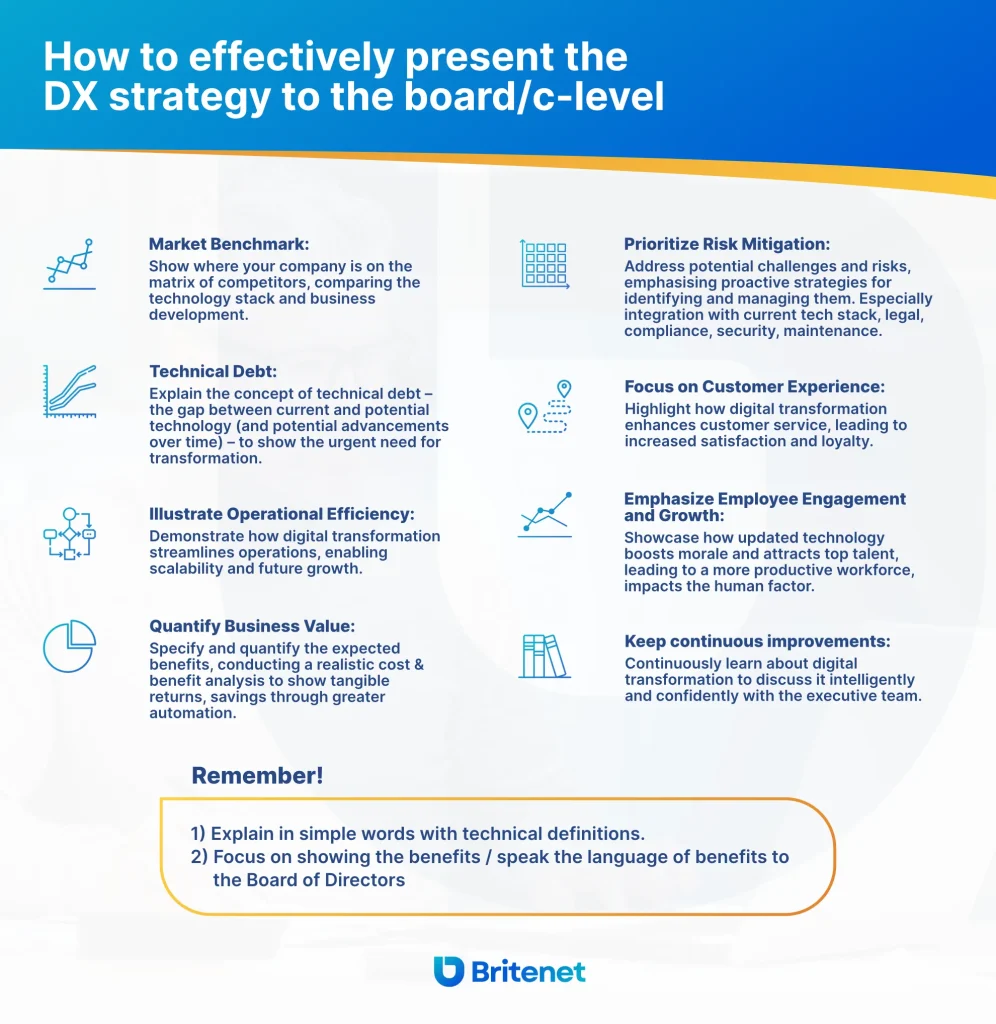Investing in digital business transformation is a must for any company that is serious about maintaining and strengthening its market position. Do you know how to avoid the three most common internal obstacles standing in the way of dynamic and successful growth? Learn some tips and solutions to fuel your company's growth.
Key takeaways from this article
- Using an external IT partner allows for more efficient budget management.
- Speaking the language of benefits will convince management to make decisions about investing in IT.
- Thoughtful delegation of IT projects allows you to fully focus on your company's growth strategy.
Take a look at our previous article and discover effective ways to overcome the biggest market problems in the digital transformation process.
First problem: optimising budget in the process of digital transformation
According to a number of international studies, financial issues are the main thing holding back many companies from starting the digital transformation process. Maintaining full control over costs in the early stages of any IT project is critical to keeping the dynamic development of the entire company.
How do you achieve such a result? Use an external partner and clearly define the cost of the project
Finding a partner who can be entrusted with a company's digital development can open up access to innovative business solutions while keeping costs under control. Supporting an internal IT team with external developers further relieves the company's budget of the cost of, among other things, recruiting or tools and equipment for a new employee.
How working with a partner reduces project implementation costs?
In digital transformation planning, the question of whether teaming up with outside experts saves money is crucial. Surprisingly, relying solely on internal teams could prove more costly. Here's why:
1. Internal IT teams are often focused on day-to-day operations, lacking the specialised experience needed for rapid and error-free transformation.
2. External IT teams work with cutting-edge technology stacks, simplifying implementation and reducing internal learning costs.
3. External teams use the latest methodologies and frameworks, such as SCRUM or SAFe, along with techniques like Event Storming and Story Mapping, streamlining development and meeting business requirements.
4. External partners bring extensive experience from similar projects, aiding in efficient problem-solving and innovative approaches.In summary, while the initial costs of external partnerships may seem high, the long-term benefits—like reduced learning curves and faster implementation—justify the investment and lead to significant cost savings in digital transformation.
Dariusz Świdrak – Project Development Leader
Second problem: demanding communication with the board
IT implementations that don't yield immediate results can look like a misguided expense in the eyes of the management. An important aspect of development is to achieve a symbiosis between understanding the company's business needs and the benefits of carrying out the company's digital transformation. The IT department must demonstrate not only technological expertise, but also the ability to present the development strategy in a language of benefits that will convince the board to invest in IT.

Third problem: planning the company's development strategy in the rush of daily tasks
Today's companies must operate in the VUCA reality – the world of volatility, uncertainty, complexity, and ambiguity – where fast and rapid changes, especially technological ones, are becoming an everyday occurrence. For companies, this means that they must immediately begin the digital transformation of their operations. At the same time, all daily operations must run smoothly. Supporting the implementation of the dynamic development of the company's strategy and overseeing day-to-day IT operations is a never-ending challenge for any CIO.

How to deal with this problem? Trust, professionalism, and a partner to help.
A great solution is to build a partnership based on professionalism and trust with your internal team, and delegate some of the routine tasks and processes to your colleagues. In the case of intensive activities or staff shortages, it is also worth betting on cooperation with a technological partner, who will take over part of the responsibility for, among other things, selecting the right technology for projects or the process of digitising existing business processes.
The increasing number of additional tasks requires managers to delegate certain tasks externally. Very often, this is the only chance to increase efficiency and accelerate the pace of change implementation without straining the budget. The most difficult part of this process is, of course, choosing a partner that fits into the DNA of our organisation. There are various models of cooperation in IT projects available on the market. When conducting discussions with clients, we try to show the synergy that comes from the innovative model developed at Britenet – the Triangle of Trust.
Our model is based on establishing cooperation with a dedicated team consisting of a Customer Success Manager, Site Manager, and HR Business Partner. The team takes it upon itself to manage the project – from verifying IT resources and development needs, monitoring progress and taking care of the technical aspects of project implementation, to monitoring the commitment and satisfaction of team members in order to keep the turnover rate as low as possible.
Michał Tomasik – Business Unit Director
Discover the benefits of a strategic alliance
Conclusions
Internal problems and difficulties are effectively slowing down the process of digital transformation of modern enterprises. Establishing cooperation with an experienced IT partner that will comprehensively take care of the implementation of projects and tasks will open the way to dynamic, sustainable growth and generate concrete financial benefits. In addition, such cooperation will save valuable time, which the company can allocate to performing current tasks.



